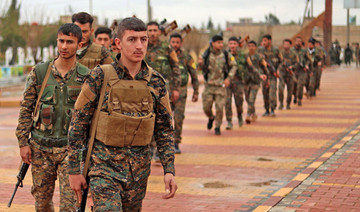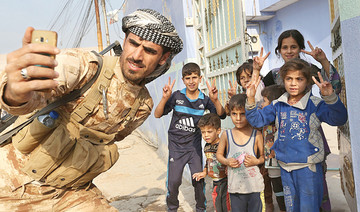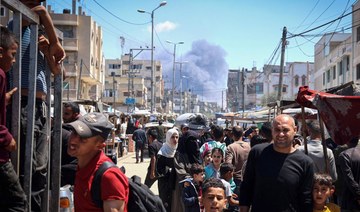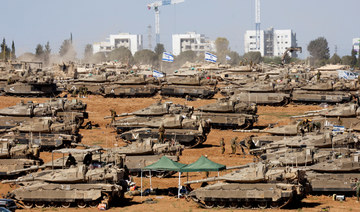HASAKEH, Syria: A Canadian extremist detained in Syria told AFP on Sunday he has been “hung out to dry” by the Daesh group like other foreign fighters and appealed to his government for help.
Mohammad Ali, 28, was captured by the US-backed Syrian Democratic Forces (SDF) some nine months ago while trying to flee north into Turkey with his Canadian wife and two children.
He was interviewed at a detention center in the northeastern city of Hasakah in the presence of two members of the SDF, who are holding hundreds of foreign extremists.
Ali, who joined Daesh in 2014 under the nom de guerre Abu Turab Al-Kanadi, said he had been interrogated by the American FBI, CIA and US defense officials, but never visited by a Canadian official.
“Every time I get taken for an interrogation or an interview, I’m hoping it’s with someone from the Canadian government, someone that can clarify my situation and give me a bit of hope.”
“Up until now, nothing,” he said. “I have nowhere else to go... How can they leave me sitting here like this in limbo?“
The Kurdish administration in northeastern Syria wants to send the prisoners back for trial, but governments in their countries of origin are often reluctant.
Canada’s foreign ministry said it had opened a communication channel with Kurdish authorities but that there was no agreement on repatriation.
The Families Against Violent Extremism (FAVE) non-profit said it knew of 25 Canadians held by the SDF.
Ali was dressed in a grey robe, matching cap and tattered black sandals.
He repeatedly said he was “exhausted” and often paused for long periods before mumbling an answer.
Like many other captured accused Daesh members, he said he joined the group to fight President Bashar Assad’s government.
He first worked in Deash’s lucrative oil ministry for four months because of his previous experience in Canada as an oil worker.
During that time, he used a prominent Twitter account to call on others to join the extremists, but said he was never part of Daesh’s formal media apparatus.
He spent the following three years as a fighter and trainer, but said he always refused to shoot civilians.
“That’s not why I came here,” he said.
AFP could not immediately verify the details of the account he gave of his time in the “caliphate.”
Ali said he began doubting his decision to join Daesh in late 2016, as the extremists began to lose territory and turn against foreigners, including a Dutch friend of his who was executed by the group.
“The foreigners feel they were left out, hung out to dry, they’ve been used and abused,” he said.
He paid a smuggler to take his Canadian wife, who he met under Daesh in Syria, and their two young girls north from Deir Ezzor province to the Turkish border.
Ali said he was planning to go to the Canadian embassy in Ankara but was caught by the SDF before crossing into Turkey.
He said he has been unable to speak to his wife or daughters, or his family in Canada, since being detained.
“All I think about is my wife and kids,” he said.
Hundreds of Daesh-affiliated men, women and children have streamed out of the group’s shrinking pocket in east Syria in the past two months, but journalists and advocates have limited access to them.
Ali said he was not aware of any SDF legal proceedings against him.
Asked what kind of future he was most afraid of, he said he feared being handed over to Syrian regime forces.
He is resigned to serving jail time at home but insisted he should not be considered in the same category as accused British Daesh executioners Alexanda Amon Kotey and El Shafee el-Sheikh, also held by the SDF.
“Now the foreigners are trying to leave, trying to get back home,” Ali told AFP.
“But a lot of the Syrians and the Iraqis, they’re just melting back into the population, holding down for a while, and when things start again, they will rise back up.
“It doesn’t really take a genius to figure this out. They have pockets in the desert, they have people intermingling with the population, acting as civilians, just biding their time.”
Canadian extremist says Daesh foreign fighters ‘hung out to dry’
Canadian extremist says Daesh foreign fighters ‘hung out to dry’
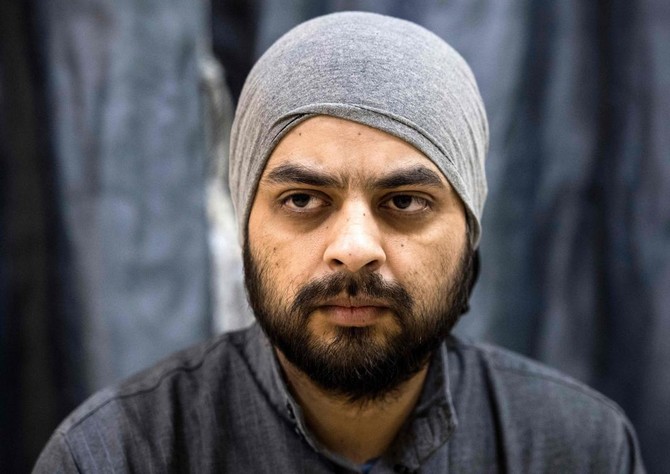
- Hundreds of Daesh-affiliated men, women and children have streamed out of the group’s shrinking pocket in east Syria in the past two months
- “The foreigners feel they were left out, hung out to dry, they’ve been used and abused,” he said
Ex-national security adviser criticizes UK PM for not suspending arms sales to Israel

- Lord Peter Ricketts: ‘Pity’ govt ‘could not have taken a stand on this and got out ahead of the US’
- American decision to pause delivery of weapons seen as warning to Israel to abandon or temper plan to invade Rafah
LONDON: A former UK national security adviser has condemned Prime Minister Rishi Sunak for failing to suspend weapons sales to Israel, The Independent reported on Wednesday.
After the US paused a delivery of bombs, Sunak has yet to follow suit despite mounting pressure from within his own Conservative Party.
Lord Peter Ricketts, a life peer in the House of Lords and retired senior diplomat, said Britain should have been “ahead of the US” in ending arms sales to Israel.
The US decision to pause the shipment of bombs is seen as a warning to Israel to abandon or temper its plan to invade Rafah in southern Gaza.
More than 1 million Palestinian civilians are sheltering in the city after being forced out of northern sections of the enclave.
Ricketts said it is a “pity” that “the government could not have taken a stand on this and got out ahead of the US.”
Conservative MP David Jones made the same call in comments to The Independent, saying: “We should give similar consideration to a pause.”
He added: “Anyone viewing the distressing scenes in Gaza will want to see an end to the fighting. Hamas is in reality beaten. Now is the time for diplomacy to bring this dreadful conflict to an end.”
At Prime Minister’s Questions in the House of Commons, Sunak faced a flurry of questions over Britain’s potential ties to an Israeli invasion of Rafah. He said the government’s position remains “unchanged.”
South Gaza hospitals have only three days’ fuel left: WHO

- Despite international objections, Israel sent tanks into the overcrowded southern city of Rafah on Tuesday and seized the nearby crossing into Egypt
- “Hospitals in the south of Gaza only have three days of fuel left, which means services may soon come to a halt,” WHO chief said
GENEVA: Hospitals in the southern Gaza Strip have only three days of fuel left, the head of the World Health Organization said Wednesday, due to closed border crossings.
Despite international objections, Israel sent tanks into the overcrowded southern city of Rafah on Tuesday and seized the nearby crossing into Egypt that is the main conduit for aid into the besieged Palestinian territory.
“The closure of the border crossing continues to prevent the UN from bringing fuel. Without fuel all humanitarian operations will stop. Border closures are also impeding delivery of humanitarian aid into Gaza,” WHO Director General Tedros Adhanom Ghebreyesus said on X, formerly Twitter.
“Hospitals in the south of Gaza only have three days of fuel left, which means services may soon come to a halt.”
Tedros said Al-Najjar, one of the three hospitals in Rafah, was no longer functioning due to the ongoing hostilities in the vicinity and the military operation in Rafah.
“At a time when fragile humanitarian operations urgently require expansion, the Rafah military operation is further limiting our ability to reach thousands of people who have been living in dire conditions without adequate food, sanitation, health services and security,” he said.
“This must stop now.”
The Geneva-based WHO is the UN’s health agency.
Israel bombarded Rafah on Wednesday as talks resumed in Cairo aimed at agreeing the terms of a truce in the seven-month war.
Gaza’s bloodiest-ever war began following Hamas’s unprecedented October 7 attack on Israel that resulted in the deaths of more than 1,170 people, mostly civilians, according to an AFP tally of Israeli official figures.
Vowing to destroy Hamas, Israel has conducted a retaliatory offensive that has killed more than 34,800 people in Gaza, mostly women and children, according to the Hamas-run territory’s health ministry.
Egypt police probe murder of Israeli-Canadian businessman
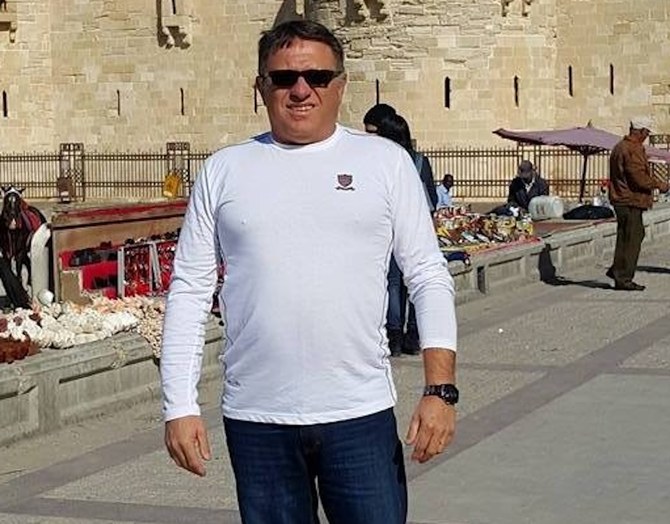
- Security sources made no link between the shooting and the dead man’s ethnic background
CAIRO: Egypt’s interior ministry said it had launched an investigation Wednesday after an Israeli-Canadian businessman was shot dead in the coastal city of Alexandria.
A police statement said the man, “a permanent resident of the country” was shot dead on Tuesday.
The Israeli foreign ministry said the murdered man was a businessman with dual Canadian-Israeli citizenship.
“He had a business in Egypt. The Israeli embassy in Cairo is in contact with the Egyptian authorities, who are investigating the circumstances of the case,” the ministry said.
Attacks on Israelis in Egypt are rare but not unprecedented.
On October 8, the day after Hamas attacked Israel triggering war in Gaza, an Egyptian policeman shot dead two Israeli tourists and their Egyptian guide.
Following their deaths, Israeli authorities advised its nationals in Egypt to leave “as soon as possible.”
Egypt was the first Arab country to sign a peace treaty with Israel but relations between the two peoples have never been warm.
The Egyptian government has often acted as mediator in flare-ups in the Israeli-Palestinian conflict that have threatened to stir up passions on the street.
Israel pounds Gaza as truce talks resume in Cairo
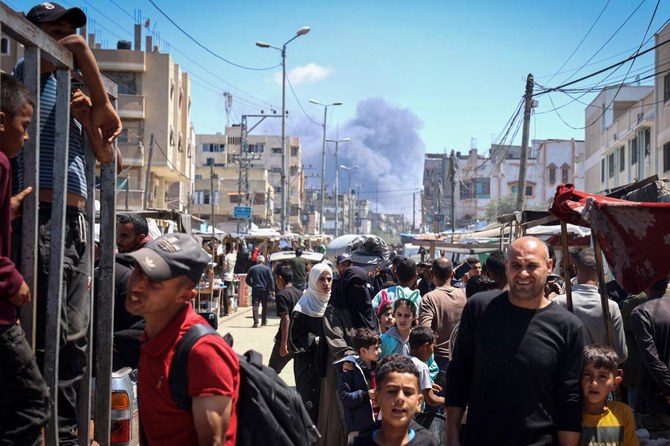
- AlQahera News: ‘Truce negotiations have resumed in Cairo today with all sides present’
- Moscow so far sees no prospect for a peace settlement in Gaza or the wider Middle East
RAFAH, Palestinian Territories: Israel bombarded the overcrowded Gaza city of Rafah, where it has launched a ground incursion, as talks resumed Wednesday in Cairo aimed at agreeing the terms of a truce in the seven-month war.
Despite international objections, Israel sent tanks into Rafah on Tuesday and seized the nearby crossing into Egypt that is the main conduit for aid into the besieged Palestinian territory.
The White House condemned the interruption to humanitarian deliveries, with a senior US official later revealing Washington had paused a shipment of bombs last week after Israel failed to address US concerns over its Rafah plans.
The Israeli military said hours later it was reopening another major aid crossing into Gaza, Kerem Shalom, as well as the Erez crossing.
But the UN agency for Palestinian refugees, UNRWA, said the Kerem Shalom crossing — which Israel shut after a rocket attack killed four soldiers on Sunday — remained closed.
It came after a night of heavy Israeli strikes and shelling across Gaza. AFPTV footage showed Palestinians scrambling in the dark to pull survivors, bloodied and caked in dust, out from under the rubble of a Rafah building.
Russia said on Wednesday that the war in Gaza was escalating due to Israel’s incursion into Rafah and that Moscow so far saw no prospect for a peace settlement in Gaza or the wider Middle East.
“An additional destabilizing factor, including for the entire region, was the launch of an Israeli military ground operation in Rafah,” Russian Foreign Ministry Spokeswoman Maria Zakharova told reporters.
“About one and a half million Palestinian civilians are concentrated there. In this regard, we demand strict compliance with the provisions of international humanitarian law.”
Speaking more broadly about efforts to find a lasting settlement in the Middle East, Zakharova said: “I would like to call it a settlement, but, alas, it is far from a settlement.”
“There are no prospects for resolving the situation in the Gaza Strip. On the contrary, the situation in the conflict zone is escalating daily.”
“We are living in Rafah in extreme fear and endless anxiety as the occupation army keeps firing artillery shells indiscriminately,” said Muhanad Ahmad Qishta, 29.
“Rafah is a witnessing a very large displacement, as places the Israeli army claims to be safe are also being bombed,” he said.
The Gaza war was sparked by Hamas’s unprecedented October 7 attack on Israel, which resulted in the deaths of more than 1,170 people, mostly civilians, according to an AFP tally of Israeli official figures.
Israel in response vowed to crush Hamas and launched a military offensive that has killed at least 34,789 people in Gaza, mostly women and children, according to the Hamas-run territory’s health ministry.
Militants also took around 250 people hostage, of whom Israel estimates 128 remain in Gaza, including 36 who are believed to be dead.
Talks aimed at agreeing a ceasefire resumed in Cairo on Wednesday “in the presence of all parties,” Egyptian media reported.
A senior Hamas official said the latest round of negotiations would be “decisive.”
“The resistance insists on the rightful demands of its people and will not give up any of our people’s rights,” he said on condition of anonymity because he was not authorized to speak publicly on the negotiations.
The official had previously warned it would be Israel’s “last chance” to free the scores of hostages still in militants’ hands.
Mediators have failed to broker a new truce since a week-long ceasefire in November saw 105 hostages freed, the Israelis among them in exchange for Palestinian prisoners held by Israel.
Mediator Qatar urges international community to prevent Rafah ‘genocide’
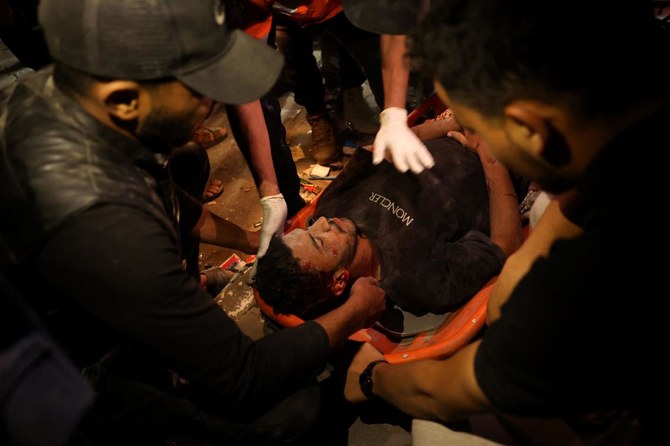
- Israel struck targets in the Gaza Strip on Wednesday after seizing the main border crossing with Egypt
- African Union condemns the Israeli military’s moves into southern Gaza’s Rafah
DOHA: Qatar called on the international community on Wednesday to prevent a “genocide” in Rafah following Israel’s seizure of the Gaza city’s crossing with Egypt and threats of a wider assault.
In a statement the Gulf state, which has been mediating between Israel and militant group Hamas, appealed “for urgent international action to prevent the city from being invaded and a crime of genocide being committed.”
Israel struck targets in the Gaza Strip on Wednesday after seizing the main border crossing with Egypt. Israel has vowed for weeks to launch a ground incursion into Rafah, despite a clamour of international objection.
The attacks on the southern city, which is packed with displaced civilians, came as negotiators and mediators met in Cairo to try to hammer out a hostage-release and truce deal in the seven-month war.
Qatar, which has hosted Hamas’s political office in Doha since 2012, has been engaged — along with Egypt and the United States — in months of behind-the-scenes mediation between Israel and the Palestinian group.
The African Union condemned Wednesday the Israeli military’s moves into southern Gaza’s Rafah, calling for the international community to stop “this deadly escalation” of the war.
AU Commission chief Moussa Faki Mahamat “firmly condemns the extension of this war to the Rafah crossing,” said a statement after Israeli tanks captured the key corridor for humanitarian aid into the besieged Palestinian territory.
Faki “expresses his extreme concern at the war undertaken by Israel in Gaza which results, at every moment, in massive deaths and systematic destruction of the conditions of human life,” the statement said.
“He calls on the entire international community to effectively coordinate collective action to stop this deadly escalation.”


